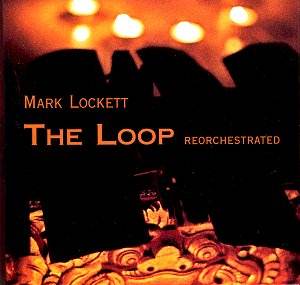This is a collection of sixteen pieces which at first
may sound very similar to each other but on repeated hearings reveal
an interesting diversity. All the pieces are mainly through-composed
by Mark Lockett (born 1956) although they may give the appearance of
extended improvisation.
The title The Loop Reorchestrated refers to
the fact that the pieces were originally performed in public and then
revised for these CDs. The public performance was at the Icon Gallery
in Birmingham and the music played continually for eight hours and took
about a year to compose.
The music is complex and on second and third listenings
reveals more and more secrets. The textures vary and to those with a
good ear this will prove quite fascinating. The music is not difficult
to listen to but each piece should, in my view, be heard separately
and considered. To hear all the pieces on one CD at one sitting might
become a strain. The music must not be relegated to background music.
I am sure that Mark will excuse my saying this but
GCE and A level music papers often have questions on world music and
this includes music of the Far East. In this context this set would
be very useful. Music of the Far East is fascinating although it has
taken us a long time to recognise its value. I love the delicacy of
the music. There is no bombast or showing off, but music for music's
sake. The opening piece Pool evokes gentle waters and piece number
14 called Ikat successfully portrays the world of Eastern textiles
with its clever interweave of music.
Of course, some people prefer showy music with fireworks
and drama and, as a consequence, this type of music is ignored. None
of it is really fast or dramatic and yet it has a quality that is refreshing.
The composer has given us a very vast work approaching four hours in
duration and he has explored this sound word to the limit.
If you want Balinese visitor-friendly sounds in a conventional
big orchestral score you should investigate the music of the Canadian
composer, Colin McPhee, who lived in Bali from 1934-9 and studied its
native music. At least two of his works show the influence of Balinese
music, Tabuh-Tabuhan of 1936 and Balinese Ceremonial Music.
But to return to Mr Lockett's work I found the third
movement Onyx to be highly impressive. Here you can hear a cogent
musical argument and some of the effects are quite remarkable. The repetitive
nature of the musical phrases suggests minimalism and John Adams but
it does make the music coherent and you should listen carefully to the
bass part which meanders with great effect. However, I fear many will
find the repetitive nature of the music somewhat tedious.
Salunding is the word to describe the type of
gamelan music the principles of which are contained in this work. Salunding
is one traditional form of gamelan restricted to the hill villages of
east Bali. The music is very ancient and the tradition dates back to
before the Javanese entered Bali in the 13th century. Traditional salunding
has three repertoires namely the music of heaven, the music of earth
and the music of hell. The first and third classifications of this music
is confined to the hill villages and there are dire consequences if
anyone outside hears it. The music is guarded. The music of hell or
the underworld is also treated with great care. The earthly music refers
to ceremonies including courtship, for example. This music is both sacred
and ancient. The usual Balinese music that is heard by visitors is mostly
dance music fluctuating from the wild to the dreamy but Mark has studied
the music of the hill villages and reproduced its principles here. Each
piece has its own texture and mood. There are musical relationships
between some pieces and the whole work has an overarched structure.
Mark composes music for the people he works with. He
does not have a publisher and you will be interested to know that he
has written conventional music including a String Quartet, some accordion
pieces and piano music. I understand that he has recently received a
commission to write a work for a Youth Orchestra.
David Wright
See also Hollowed
Ground
